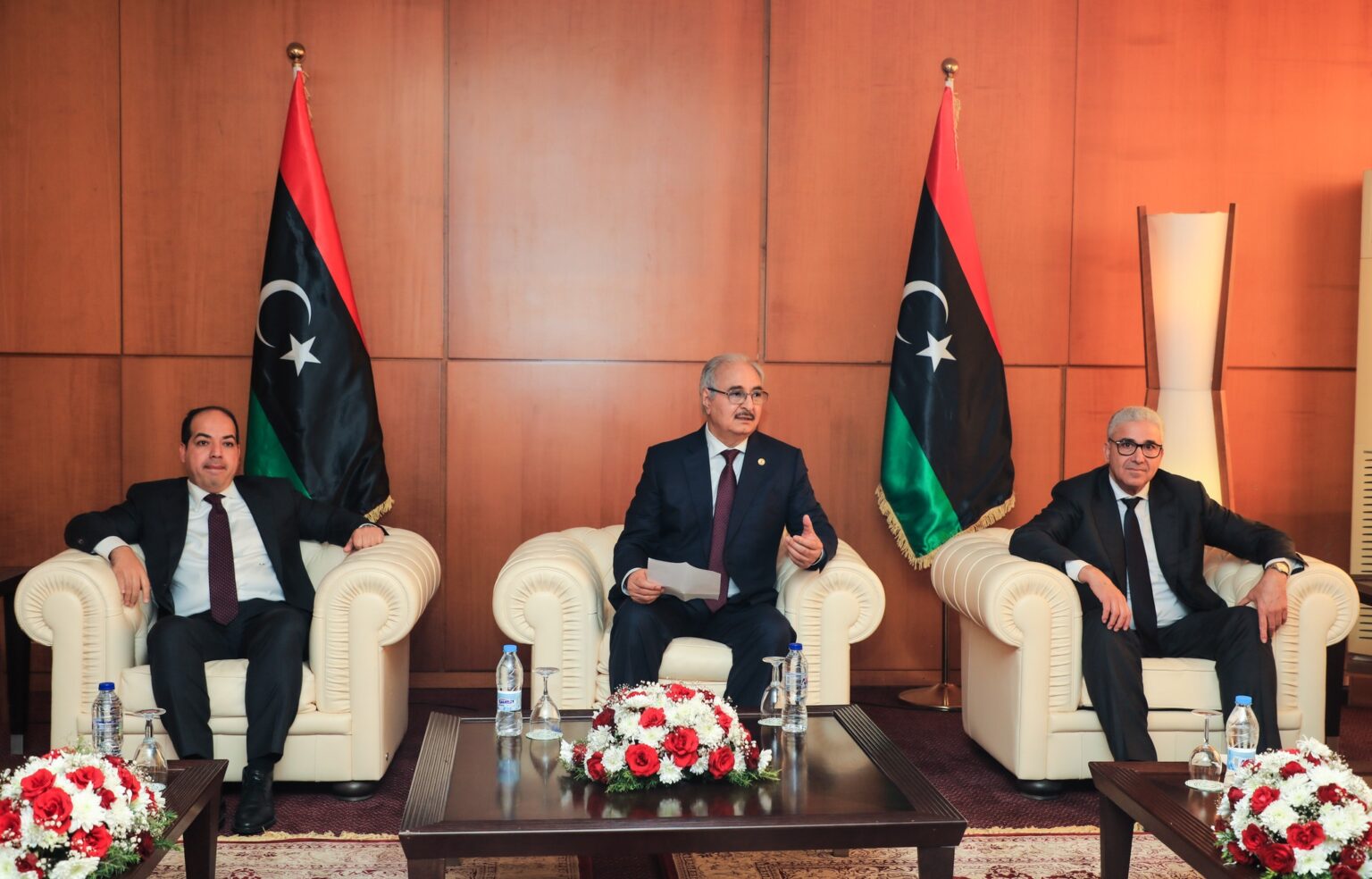Libya’s economy has been teetering on the edge of a precipice since the ousting and killing of Colonel Muammar Gaddafi in 2011, as part of the protests that marked the Arab Spring. Once a progressive economy now a war-torn country, a playground for foreign powers rushing to satisfy their own interests, has left ordinary Libyan citizens to bear the brunt of a cycle of conflicts and civil wars, stagnating economic growth for a decade. The conflict birthed an unmatched refugee crisis, with thousands crossing the Mediterranean to seek greener pastures in Europe. (https://pragermetis.com/) Today’s Libya remains in electoral limbo as the political stalemate persists. Prospects for elections fade daily.
The situation in the country remains extremely volatile, rife with political uncertainty as to when a national government will be formed, and the formulation of a constitution thereof. Both presidential and parliamentary elections, slated to be held this year have been postponed several times with no exact date set.
The country awash with violent non-state actors where different militia groups vie for political power are being backed by foreign entities in a bid to control the country’s oil and gas sector. As the first anniversary of the postponed elections draws nigh, there is no clear end in sight. The UN Special Representative Abdoulaye Bathily, warned against prolonging the interim period as Libya could become even more vulnerable to political, economic and security instability, as well as risk of partition.
Also Read: The Sahara Still Remembers…a Haunted Past Versus Africa’s Nuclear Future
According to a report by the World Bank on Libya’s economy, its impossible to forecast economic outcomes for the country with any degree of confidence, due to the high level of uncertainty surrounding political and security development. The Bank further projected that should oil production and exports continue without major extended disruptions, Libya will benefit from soaring global oil prices, which will translate into higher fiscal revenues and inflow of hard currency. Consequently, this will positively affect the trade, current account and fiscal balances.
Indeed, Gaddafi’s prophecy has come to pass. “There is a conspiracy to control Libyan oil and to control Libyan land, to colonize Libya once again. This is impossible, impossible. We will fight until the last man and last woman to defend Libya from east to west, north to south,” said the Colonel in a televised message for the pro-regime station, two months before he was killed.

Photo/Egypt Today
Under his regime, Libya had grown from one of the poorest countries to one of the richest in the continent, having achieved economic independence. By the same token, per capita income in Libya rose to more than $11,000 under his reign making it the fifth highest in Africa.
To boot, Libya’s economy flourished under Gaddafi, education and medical treatment was free for citizens, the country had no external debt and had reserves of $150B most of which were frozen globally. By the same token, the price of petrol was $0.14 per litre among the lowest in the world. Having a home was considered a human right. In his green book, the Colonel had vowed that he would not secure a home for his own parents until every citizen had one. He championed for gender equality where women were free to work without constraints, further building the economy. Libyans had enough food security, with the Great Man-Made River Project, the world’s largest irrigation project, Gaddafi was securing an even brighter agricultural future to feed his nation.
Over and above, he launched a programme to privatize all Libyan oil to every citizen. This would initially provide $21,000 to every citizen from a total of $32 billion in 2011, and effectively lead to the dissolution of the ministries of health, education and others to eliminate corruption, theft of oil by foreign companies and decentralize power. The political and economic upheavals due to civil wars have left the country in a deplorable state, eroding the progress that Gaddafi had built across all sectors from infrastructure to oil production.
According to the 2022 African Economic Outlook (AEO) by the AfDB, Libya’s economy was projected to grow by 3.5 percent in 2022 and 4.4 percent in 2023. This was dependent on political stabilization, security improvements, and persistence of oil production. Inflation was slated to stay elevated at 3.7% in 2022, before falling a little to 2.4% in 2023, driven by international food prices. The fiscal balance had additionally been expected to record a surplus of 25.8% of GDP in 2022 and 17.3% in 2023 due to higher revenues from oil output. Downside risks include political instability, an oil blockade, social instability that has left more than 1.3 million need humanitarian aid.
The future of Libya’s economy is pegged to its political climate. Should a new constitution be formed and elections held, then an economic roadmap can be drawn that can be the foundation of rebuilding the country. Going forward economic diversification is also needed, coupled with the reconstruction of public infrastructure. Key sectors that Libya should tap into, once political stability is achieved include:
Oil and Gas in Libya
Crude oil and natural gas export revenues are a significant part of Libya’s economy. The country is global leading producer of oil and petroleum products. According to Libya’s Central Bank, oil revenues accounted for an estimated 98% of Libya’s total government revenues in 2021.
Libya holds the largest oil and gas reserves in Africa and is the ninth world largest producer, with recoverable reserves pegged at 48 billion barrels of oil and 52 trillion cubic feet of natural gas. . Its production levels stand at an average of around 1.3 million bpd, with the hope of achieving 1.8 million bpd in 2022. The country is focused on rehabilitating its oil sector by revamping exploration and resuming drilling campaigns in key basins, while enhancing investment in existing infrastructure.
Renewable sources of energy such as solar and wind, have great potential to build the country’s economy, given the abundance of both sun and wind in any desert-country.
Also Read: Powering Africa: Renewables safest bet for sustainable future
Agriculture -Irrigation in Libya
Libya can tap into irrigation to achieve food security. The Great Man-Made River which was dubbed “The eighth wonder of the world” can be revived and necessary reconstruction done to the damaged infrastructure from the NATO bombing. Gaddafi had discovered that Libya′s riches were not only in oil, but also in water. The world′s biggest reservoirs of fossil freshwater still lie below its desert. Prior to their destruction in 2011, these aquifers provided the country with water for consumption and agriculture, through an extensive pipeline system.
Libya′s Great Man-Made River (GMMR) transported almost 2.5 million cubic metres of water daily. Piped through an underground network from the Nubian Sandstone Aquifer System in the Great Sahara desert to the coastal urban centres, including Tripoli and Benghazi, the water covered a distance of up to 1,600 kilometres. The GMMR provided 70 % of all freshwater used in Libya. The country mostly grew fruits and vegetables such as dates, almonds, grapes, citrus fruits, watermelon, olives, and tomatoes, which constitute about 80 percent of annual agricultural production.
In 1954, agriculture used to play a bigger role in the economy and its contribution to the GDP was 26 per cent. Once politically stable the country can revive the sector.
Reving Libya’s Tourism Industry
Once the country is stable, tourism can contribute to the economy given the country’s rich cultural history. The country has five UNESCO World Heritage Sites, three of which are classical ruins, which prior to 2011 used to attract many tourists. They include: the Roman cities of Sabratha and Leptis Magna in the west Greek ruins of Cyrene in the east, Libyan Lost City of Germa among many others. Tripoli the de facto capital of Libya once known as the ‘White Bride of the Mediterranean’ was additionally a popular tourist destination prior to the conflict especially known for its distinct architecture.
If only Libya manages to get itself in gear, fix its political shambles, will the country soar to the vision its former leader wished it to be. For that to happen, will Western nations ever agree in a unified Libya. With all the cooks in the kitchen, the story unfolding seems a daunting task, especially coupled with foreign interests making headway. The matter today must be addressed in a fashion that allows for a unified nation, but who knows what external extremities may have in mind.




